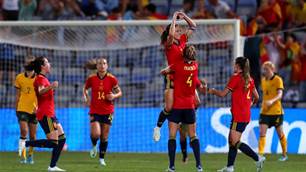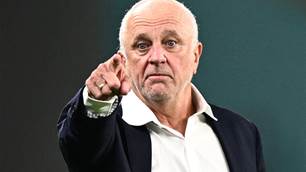GROUP C's two heavyweights face off in the most crucial match for both teams at the Al Gharafa Stadium, early on Saturday morning Australian time.
This battle of the top and third ranked teams in Asia will go a long way to defining the Asian Cup paths of both the 26th-ranked Australians and the 39th-ranked Koreans.
Both teams had relatively comfortable first-up wins, avoiding any issues with injuries and both should go in to the match at close to full strength.
For the Socceroos, that means pretty much the same line-up they took into the opening 4-0 win against India, while for South Korea, they will be missing suspended defender Kwak Tae-Hwi.
Australian coach Holger Osieck decided just ahead of the opening game to pair Harry Kewell and Tim Cahill upfront and given both players got their names on the scoresheet - Cahill twice - then you would have to say it was a success, even against a lesser quality opposition.
The biggest problem Australia have had with Kewell and Cahill over the years is getting them both fit and in form at the same time, but both looked very much in good health and good touch against India.
Brett Holman continues to improve and has become one of Australia's keys through the midfield while Brett Emerton enjoyed the space he was allowed on the right.
Most of Australia's attacks against India came through that channel, either through Emerton or Luke Wilkshire, and you can expect South Korean coach Cho Kwang Rae to have taken note of that and briefed his first choice left back Lee Young Pyo, formerly of Tottenham.
On the other side, Holman probably didn't get the support he would have liked, with David Carney a little shy of overlapping.
If the Blackpool full back was reticent to push forward against India, then you get the feeling he will be even more pegged back against a high quality team featuring Celtic's Cha Du Ri, who is likely to be powering down that side of the park.
Jason Culina was able to do what he liked against India, but will have greater defensive responsibilities this time around. Having said that, his distribution is crucial going forward, which will place greater pressure on his new midfield partner Mile Jedinak - who should retain his spot ahead of Carl Valeri - to break the play up.
Cho has already identified Sasa Ognenovski, a dominant force in the K-League over the past couple of years, as a point of weakness, saying he will deliberately try to exploit the lack of pace of the big man and his central defensive partner Lucas Neill.
The key man for South Korea will be attacking midfielder Koo Ja-Cheol, who scored both goals in the opener against Bahrain. He only came into the side after Monaco striker Park Chu-Young injured his knee celebrating a goal for his team last month.
Man Utd's Park Ji-Sung will be the architect from the midfield and Australia will be looking to nullify his influence, while Bolton's Lee Chong Yong gets himself heavily involved in attack. Celtic full back Cha will give plenty of speed and industry out on the right. Coach Cho needs to work out his best option to replace Kwak in the middle of the defence.
The stand out thing about Australia's 3-1 loss to South Korea in Seoul 16 months ago was the Socceroos' inability to cope with the pace and technical proficiency of their opponents. The Australian defence was opened up on multiple occasions and they could have been 4-1 down by half time.
The two teams who will play each other in Doha on Saturday are vastly changed, which each only likely to feature three of the same players in their starting XIs, but doubts persist over Australia's ability to match it with Korean teams in a battle of techniques.
It means that Osieck will be better placed pursuing a game plan which plays to Australia's strengths, so using their physicality and athleticism to win the day, much the same tactic which has been successfully deployed against Japan in recent years.
The array of aerial balls played into the box against India would indicate that Australia may try to prevent the game being played on the deck, thus negating the speed and dribbling skills advantage of their opposition. They will aim to wear down the Korean defence and starve the Korean midfield and attack of quality balls.
It may seem like a negative tactic, but the fact is Australia have the oldest squad in the entire tournament and that squad aren't going to win the Asian Cup by playing beautiful football. They need to make the best use of their experience and physically dominate games.
It will be a fascinating clash of styles and will define Australia's hopes of winning their first-ever meaningful piece of football silverware.
Head-to-head
Played 23: Wins: Australia 9, Korea Republic 6, Draws: 8
Previous Meeting
Korea Republic 3, Australia 1, Seoul, September 2009
Past five matches:
Australia:
Australia 4, India 0, Doha, January 2011
UAE 0, Australia 0, Al Ain, January 2011
Egypt 3, Australia 0, Cairo, November 2010
Australia 1, Paraguay 0, Sydney, October 2010
Poland 1, Australia 2, Krakow, September 2010
Korea Republic:
Korea Republic 2, Bahrain 1, Doha, January 2011
Syria 0, Korea Republic 1, Abu Dhabi, December 2010
Korea Republic 0, Japan 0, Seoul, October 2010
Korea Republic 0, Iran 1, Seoul, September 2010
Korea Republic 2, Nigeria 1, Suwon, August 2010
Related Articles

Matildas 'have parked' 7-0 thrashing: 'We're one of the best pressing teams in the world'

Socceroos coach says Argentina can only 'play two ways'













